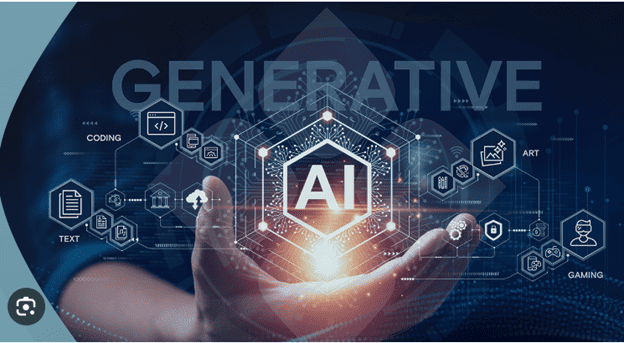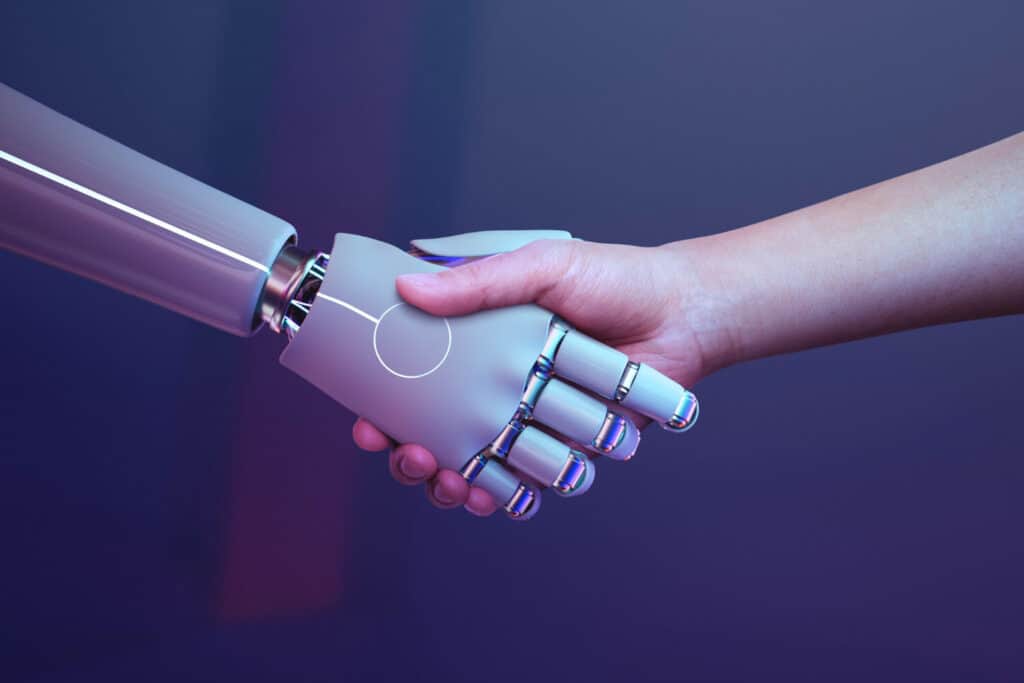
IA Generativa: A chave para a Transformação Digital e o crescimento exponencial
Ainteligência artificial generativa surge como uma poderosa aliada, abrindo portas para um universo de possibilidades antes inimagináveis.

Ainteligência artificial generativa surge como uma poderosa aliada, abrindo portas para um universo de possibilidades antes inimagináveis.

O digital continua sendo fundamental, mas somente se for em função da sustentabilidade econômica, ambiental e social, com efeitos positivos sobre a mobilidade, a redução da poluição e da desigualdade

A inteligência artificial generativa se encontra com a tecnologia para impulsionar a inovação no cenário corporativo, onde a diferenciação é peça-chave. Nesta era digital em constante mudança, empresas buscam diferenciais competitivos que as elevem acima da multidão. A IA generativa surge como uma ferramenta poderosa para desbravar novas fronteiras e transformar como os indivíduos operam.

O congresso RPA & AI CONGRESS, o maior evento de multimercados sobre RPA do Brasil, teve mais uma edição realizada no Rio de Janeiro nos dias 22 e 23 de agosto de 2023.

BIP.Monticello recently attended the ChatGPT and Generative AI for CX: Hype, Reality, What to Know and Do webinar. The webinar showed how advancement in Generative Pre-trained Transformer (GPT) technology can help people working in Customer Experience (CX) roles and the exciting capabilities of OpenAI’s ChatGPT. ChatGPT can engage in conversations and provide answers within the context of what has been discussed. It can communicate in different styles, tones, languages, and formats, depending on how the user prompts it. ChatGPT excels at producing answers that are pithy and understandable. There are several use cases where ChatGPT can improve the productivity of a CX team. Ian Jones, the Head of Strategic Solutions for eGain, commented that “writing content, particularly customer service content, is really hard, and from my experience working with clients, they really struggle.” ChatGPT can quickly produce an answer in the form of an article, an email, a letter, or even a brief chatbot response. It can save CX teams time with basic information gathering and research. However, CX teams will still have to review what ChatGPT generates for content accuracy and relevance. ChatGPT can summarize larger amounts of customer feedback and turn it into valuable insights. CX teams can take user feedback submitted online and ask ChatGPT to analyze the data and summarize actionable points from it. These productivity improvements allow CX teams to do more work with fewer people and focus on more value-added work. Early adopters of generative AI tools should be mindful of their shortcomings. When applying GPT to the use cases mentioned above, it is important to review any content that ChatGPT creates for accuracy. Because of how convincing generative AI responses are, it is easy to believe the answers are 100% true, even when they are not. As a result, there are concerns about misinformation generated by these tools. Additionally, there are privacy concerns with ChatGPT. Although OpenAI has indicated that user searches are private, there was a bug uncovered recently that allowed some users to see titles and chat history from other users. Privacy concerns prompted Italy to temporarily ban ChatGPT for widespread use until OpenAI made necessary safety changes to appease the regulators. In January 2023, only two months after its launch in late November 2022, ChatGPT had 100 million monthly active users. Its adoption is faster than social media platforms like TikTok or Instagram, making it the fastest-growing consumer internet app ever. ChatGPT will continue to develop and become safer with improvements to address privacy and regulatory concerns. Its applications to CX and other user cases will improve productivity and foster innovations. As Ashu Roy, CEO of eGain, commented, “With ChatGPT, it seems like we are ever so close to the possibility of potentially augmenting a significant amount of work that customer experience Associates are doing on the front lines, as well as automating significant parts of customer experience interactions where it makes sense.” About BIP.Monticello BIP.Monticello, a member of the BIP Group, is a management consulting firm supporting the financial services industry with its expertise in digital transformation, change management, and financial services advisory. Our understanding of the competitive forces reshaping business models in capital markets and digital banking are proven enablers that help our clients drive innovative change programs to be more competitive and gain market share in new and existing businesses. In partnership with Bip.xTech, we collaborate with our clients to infuse the spirit of data-driven organizations and build digital solutions in areas of AI, Natural Language Processing (NLP) and Machine Learning, helping them make their operations more efficient and achieve a competitive advantage in their Digital Transformation journeys.

“Artificial Intelligence is more profound than fire, electricity, or the internet” -Sundar Pichai, Chief Executive Officer of Alphabet Background on AI/ML and Software Testing Trends Artificial Intelligence (AI) and Machine Learning (ML) have gained significant attention due to their disruptive potential across industries. In the context of software testing, AI/ML can enhance testing methodologies and processes to achieve more effective and efficient results. AI continues to enter domains previously reserved for human skills and the results have been staggering. Machine Learning (ML), a subset of AI, further enables systems to learn and improve continuously through the application of algorithms. What is AI/ML-based testing? AI/ML-based testing methodologies have the potential to revolutionize test case creation, maintenance, and analysis, leading to expanded test coverage, improved accuracy, cost savings, and faster times to market. Such algorithms can access test data, make sense of it through pattern identification, and then utilize these predictions to successfully streamline software testing – thus simplifying test creation, reducing test maintenance, and driving new ways to assess the results. As we delve into the future of AI/ML in software testing, it becomes clear that testing teams need to prepare themselves for the upcoming advancements in this field. Test Case Creation: Using the analogy of self-driving cars, AI/ML tools are more similar to driving assistance than an actual driverless car1. In other words, AI technologies allow the user to write test cases manually while a machine automates them. AI/ML technologies augment test case creation by identifying reusable components and automating test authoring. ML models can further improve the test suite by identifying areas for enhancement and generating additional test cases. Test Case Analysis: AI/ML-based validation tools can automatically analyze code, identify bugs, and detect even the most granular changes. This thorough analysis allows testers to focus on high-risk areas and improve code quality. Test Case Maintenance: AI/ML can help answer the question, “If I’ve made a change in this piece of code, what’s the minimum number of tests I should be able to run to figure out whether this change is good or bad? 2” AI/ML tools employ self-learning capabilities to detect updates, upgrades, and code changes that require modifications in test scripts. These tools automatically revise test scripts, reducing the need for manual intervention. Additionally, ML models can identify the minimum number of tests needed to verify changed code, thus minimizing redundant test execution. Benefits of AI/ML in Testing By leveraging AI/ML in the testing process, organizations can unlock several benefits3. This section discusses the advantages of AI/ML-based testing: More Expansive Test Coverage: Applying automation and AI/ML to testing can increase the overall depth and scope of tests. As expected, automation allows for a significantly higher degree of test execution. AI/ML tools can learn from user sessions, identify missing tests, and self-correct, resulting in improved test coverage. Improved Accuracy / Defect Reduction: Automation reduces errors in software testing, while AI/ML algorithms continuously update themselves to enhance accuracy. AI/ML-based testing aids in defect identification and offers opportunities for precise defect prediction. Cost Savings and Faster Time to Market: Manual software testing is time-consuming and expensive. AI/ML-driven testing accelerates the process, reduces redundancy, and improves productivity. Faster test execution and the ability to rerun tests at a rapid pace leads to cost savings and a faster time to market. Looking Ahead The future of AI/ML in software testing holds great promise. Ongoing research in ML automation coupled with increased adoption of AI/ML testing applications is expected to drive significant improvements. Testing teams must prepare for these advancements by staying updated with evolving trends and acquiring the necessary skills and tools. Conclusion AI/ML-based testing is poised to reshape the software testing landscape, offering enhanced test case creation, maintenance, and analysis capabilities. The benefits include expansive test coverage, improved accuracy, cost savings, and faster times to market. As AI/ML continues to evolve, testing teams must embrace these trends and equip themselves with the knowledge and tools necessary for its overall adoption and successful implementation. About BIP.Monticello BIP.Monticello, a member of the BIP Group, is a management consulting firm supporting the financial services industry with its expertise in digital transformation, change management, and financial services advisory. Our understanding of the competitive forces reshaping business models in capital markets and digital banking are proven enablers that help our clients drive innovative change programs to be more competitive and gain market share in new and existing businesses. Sources 1. AI In Test Automation: Here’s How It Works 2. 5-Great Ways to Use AI in Your Test Automation 3. AI in Software Testing – Benefits, Approaches, Tools to Look in 2022 (testingxperts.com)

Significance of Artificial Intelligence in the Banking Industry Today Artificial Intelligence (AI) is revolutionizing customer service in the banking industry and transforming how companies operate and interact with their customers, especially within the banking sector. AI-powered solutions allow companies to deliver personalized, efficient, and accurate service to their customers, ultimately leading to higher levels of customer satisfaction and loyalty. Through the use of chatbots, machine-learning algorithms, voice recognition technologies, and other advanced AI technologies, companies are enhancing their customer service capabilities in ways that were once unimaginable. How Artificial Intelligence is Improving Customer Service in Financial Services In the financial services industry, banks and other organizations are expected to take advantage of AI to make their customers’ lives more time-efficient and easier. Here are some ways that AI can improve customer service: 1) Use of Chatbots Chatbots are computer programs that use natural language processing (NLP) to understand and respond to customer queries. These bots can handle a large volume of customer inquiries on a 24/7 basis, which reduces the need for human intervention and allows customers to receive responses immediately to any questions they may have and avoid long waiting times on the phone. According to statistics, service representatives save about 4 minutes of their time for every query a chatbot handles, saving up to $0.70 per query (Source 1). Below is a diagram that describes the inputs and outputs of a chatbot using NLP: 2) Personalization of Customers’ Banking Experiences By analyzing customer data, transaction history, and demographics, AI technology, such as chatbots, can provide tailored recommendations, personalized advice, and even financial products relevant to the customer’s specific needs and risk appetite. For instance, if the AI has observed a customer’s spending habits for long enough, it will be able to use real-time tracking to help prevent the adaptation of poor spending habits and alert customers when they reach a specific spending level in their accounts (Source 3). Furthermore, banks can utilize AI to create personalized financial dashboards that give customers a complete view of their financial standing. This includes personalized budgets, savings plans, and investment strategies that are tailored to the customer’s financial goals (Source 4). The below two diagrams capture the level of comfort per age group with companies using AI to access personal data as well as a study indicating that higher customer satisfaction tends to result in higher returns, respectively: 3) Prevention of Fraud AI can prevent bank fraud by using machine-learning algorithms to analyze customer behavior and transaction data to detect real-time anomalies and suspicious activities. Any unusual behavior by the customer, such as a sudden increase in the number of large sum money transfers to an unknown account, will be picked up by these algorithms and alert the bank’s fraud detection team to investigate and take the necessary measures. As online banking is almost second nature to most customers, AI can also monitor online banking activity and identify fraudulent attempts to access accounts (Source 7). For instance, if an individual tries to access an account from a new location or use an unfamiliar device, the AI will detect this and require the user to take additional security measures, such as two-factor authentication, to ensure they are indeed the correct owner of the account. 4) Voice Assistants Like Amazon’s Alexa, Apple’s Siri, or Google Assistant, banks can also use voice assistants to provide customers with voice-activated banking services. For example, customers can ask about their account balances, transfer funds, or pay bills by using their voice. Like chatbots, voice assistants use NLP and machine-learning algorithms to better understand customer queries and provide relevant responses (source 8). At the time of the launch of Amazon’s Alexa, Bank of America introduced Erica in 2016, which would closely observe customers’ transactions and analyze their financial patterns (source 9). According to an Ipsos-Forbes Advisor survey, since approximately 8 out of 10 Americans use online banking, it will only be a matter of time until AI technology further improves and customers develop a greater comfort level using digitized customer service technologies, such as voice assistants. 5) Cost Reduction and Resource Optimization According to IBM, businesses worldwide spend over $1.3 trillion on 265 billion customer service calls each year (source 10). Chatbots can significantly reduce service costs by speeding up response times and answering frequently asked questions, allowing banking agents to focus on more challenging and situational tasks. For instance, a new report by Gartner showed that replacing human agents with AI chatbots could save the call center industry up to $80 billion in labor costs per year by 2026 and $240 billion by 2031 (Source 11). Gartner also estimates the implementation cost to be approximately between $1,000 and $1,500 per conversational AI agent, which is still significantly less than the average cost of hiring a human agent which is around $29,000 per year (Source 12). Challenges of Implementing AI in the Financial Services Industry Despite the numerous advantages AI can bring to the banking sector, implementing AI in the financial services industry also poses many challenges, ranging from data quality and privacy concerns to regulatory adherence. A few key challenges are: 1. Data Quality and Availability For AI to provide accurate predictions and decisions to customers, large amounts of high-quality data are required to train the AI algorithms (Source 13). Banking data can be highly complex and diverse because various data elements are stored in disparate systems. Therefore, ensuring data quality, completeness and accessibility across multiple sources can be a significant challenge. 2. Data Privacy and Security As banks handle sensitive customer information, including personal and financial data, implementing AI requires careful attention to data privacy and security regulations, such as the General Data Protection Regulation (GDPR) or the California Consumer Privacy Act (CCPA) (Source 14). Banks must ensure their AI systems adhere to these regulations and protect customer data from unauthorized access or breaches. 3. Regulatory Compliance While there are heavy regulations in the banking industry to maintain stability, protect consumers, and prevent money laundering and

Como as pessoas precisam de navegação por satélite para chegar aos destinos, as empresas precisam de ajuda para otimizar e automatizar a tomada de decisões. E radicalmente falando, a automação total dos processos de negócios baseada em dados e KPIs, a chamada Hyperautomation, poderia ser comparada com veículos autônomos.

No dia 26 de junho, o Grupo BIP anunciou uma parceria com a Credo AI para ajudar os clientes a abordar a crescente necessidade de governar soluções de IA de forma responsável.

A publicação do relatório mais recente do Governo do Reino Unido sobre Inteligência Artificial (IA) “A pro-innovation approach to AI regulation” (uma abordagem pró-inovadora para a regulamentação de IA), fornece detalhes sobre como o governo do Reino Unido irá “apoiar a inovação, ao passo que proporciona simultaneamente uma estrutura para garantir que os riscos são identificados e abordados”.